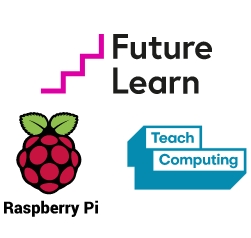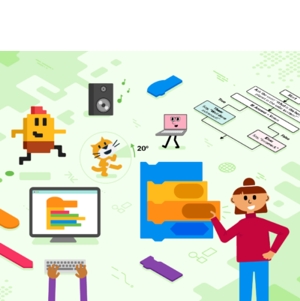| Free 'n Easy - A New Introduction To Scratch Programming |
| Written by Sue Gee | |||
| Friday, 11 February 2022 | |||
|
The Raspberry Pi Foundation has once again joined forces with FutureLearn and Teach Computing. This time it is to offer a course that introduces the fundamentals of computing using the block-based programming language Scratch. The brand new course Introduction to Programming with Scratch is described on the Raspberry Pi Foundation Blog as a fun, creative, and colourful starting point for those who want to take their first steps on their programming journey. Aimed at educators/parents who want to help their students /children with digital skills, or anyone who is curious about coding, this 4-week FutureLearn short course is intended to provide an introduction to block-based programming, specifically with Scratch, and how it can be used to learn about the fundamentals of programming and develop computational thinking. The course uses Scratch, the beginner-friendly, visual programming language that is particularly suitable for creating animations and games and all that is required is a computer or tablet with a web browser and internet connection that can access the online Scratch editor. Throughout the course participants learn to make their own programs step-by-step culminating in the final week with creating musical projects and interacting with programs using a webcam. They are also encouraged to share their programs and to join the Scratch online community where they can explore other people’s Scratch programs for inspiration and support and to build on their own code.
On the Future learn platform, the course consists not only of bite-size videos and long- and short-form articles and quiz questions but also peer-led discussions, trainer interaction and practical activities to help you embed your new knowledge. As well as learning what you can do with Scratch in this course, you’ll be learning basic programming concepts that are the same for all programming languages. You’ll see how the order of commands is important (sequencing), you’ll make the computer repeat actions (repetition), and you’ll write programs that do different things in different circumstances, for example responding to your user’s actions (selection). Later on, you’ll also make your own reusable code blocks (abstraction). The course requires about 8 hours of effort (2 hours per week over a period of 4 weeks). It starts for the first time on February 14th and will repeat at 3 monthly intervals. You can join it at any time once it starts and the Free option is limited to 4 weeks access from the date you join. If you want a certificate for successful completion, or want access to it beyond 4 weeks, you can upgrade for £44. Or, if you also want to access more of Future Learn's hundreds of short courses with certificates for each of them, an Unlimited subscription costs £199.99 per year. If you’re a teacher in England, get free extended access by signing up through Teach Computing. One possible follow on from this introduction to block-based programming is Introduction to Programming with Python, a 4 week course requiring 3 hrs per week. If these courses whet you appetite for understanding programming and computational thought and how they change the way you think about problems and how to go about solving them, an excellent companion is provided by The Trick Of The Mind the latest book in the I Programmer Library. In this book Mike James takes programming concepts and explains what the skill involves and how a programmer goes about it. If you're a programmer, his intent is to give you a clearer understanding of what you do so you value it even more. If you are a non-programmer the book reveals what an amazing skill programming is and why it should be taught to everybody, whatever their age
More InformationIntroduction to Programming with Scratch Related ArticlesRaspberry Pi For Teachers on Future Learn Introducing Object-Oriented Programming To Teachers Prepare to Run a Code Club with Future Learn To be informed about new articles on I Programmer, sign up for our weekly newsletter, subscribe to the RSS feed and follow us on Twitter, Facebook or Linkedin.
Comments
or email your comment to: comments@i-programmer.info <ASIN:1871962722> <ASIN:B09MDL5J1S>
|
|||
| Last Updated ( Friday, 11 February 2022 ) |



